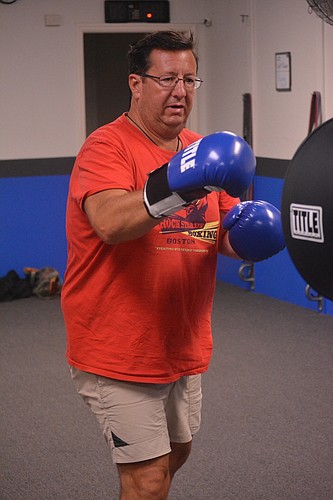- May 23, 2025
-
-
Loading

Loading

Michael Roy first knew something was wrong in fall 2013.
His handwriting became cramped and close to illegible, a disorder called micrographia. His wife, Michele Westin, began asking Roy questions about his arm, which was swinging less on the pair’s walks. He told her it was just tired.
It wasn’t. Roy had a guess as to what was wrong, but did not want to face the reality of his suspicion.
“I was pushing it to the back of my head, saying ‘Nah, it can’t be that. It can’t be that,’” he said.
The “it” referred to Parkinson’s disease, and he was wrong.
Roy, 55, was found to have the disease in April 2014. He was in New Hampshire at the time, and went to a doctor with a high school friend, Brian Hall, whose Parkinson’s had been diagnosed as a teenager. The hourlong car ride home was filled with tears.
In the years following his diagnosis, Roy developed tremors in his upper body and felt rigid. The hardest thing to do was sleep.
“Rolling around in bed was like wearing a Velcro suit,” Roy said. “Couldn’t roll over. Couldn’t pull the covers down, couldn’t pull them back up.”
In 2016, Roy saw a shining light break through the darkness. He found Rock Steady Boxing, a national program designed especially for Parkinson’s patients.
“Boxing is fast,” said Maureen Corristan, owner of Sarasota’s B-Mo Fit gym. “Parkinson’s patients struggle moving slow. The forced intense exercise helps combat symptoms.”
Corristan and trainer Tony Spain received their Rock Steady Boxing certification in October, and began offering the program at the gym in January. Roy has been attending their classes twice a week since then, and also attends a Rock Steady class near his New Hampshire home when not in Sarasota. Corristan, who has 30 years of experience in sports medicine, felt moved to become Rock Steady-certified after a local man with Parkinson’s brought the program to her attention.
Roy credits the non-contact training program with improving his overall health. It’s a well-rounded program, he said, featuring stretches, core workouts and “brain games,” like rapidly naming different states or colors to help cognitive thinking.
Variety in exercises helps. Each of the B-Mo Fit’s 10 stations, which include punching bags, boxing dummies and “peanut bags,” will change from Monday’s workout to Thursday’s to target different muscle groups, he said. One of those muscle groups is in the throat. Parkinson’s patients can lose the ability to speak if they don’t regularly (and loudly) use their voice, so Corristan has her athletes verbally count reps and cheer on other classmates during the sessions. Athletes of similar abilities are paired together to ensure everyone is getting an appropriately challenging workout, she said.
The class also acts as a type of support group. Before class, the athletes mingle, reminisce about where they are from and discuss what they have been doing. There’s an instant kinship among classmates. None of them lets Parkinson’s affect his or her mood. Corristan and Spain help keep their spirits up by joking with them and playing music. On April 27, it was a mix of classic hits, starting with Bob Seger’s “Old Time Rock and Roll.”
Roy recently rode his bike for the first time in two-and-a-half years, and played pickleball for the first time. He can swim 20 laps in a pool. He is now able to get in and out of bed on his own. The “Velcro suit” feeling is gone. Roy feels great, and he’s found a belief in himself he once lost.
He used to be scared of the future, but those fears have been given a knockout punch.
“A lot of people who have the disease let the disease take over, and they lose their future, in a sense,” Roy said. “They don’t have any movement anymore. Their quality of life diminishes tremendously. Everyone says ‘Don’t live your life in a recliner, because you’re going to end up stuck there.’
“It (Rock Steady) has improved my confidence in a lot of things. It’s given me the hope that as long as I keep active, I’m not going to fall victim to the disease.”